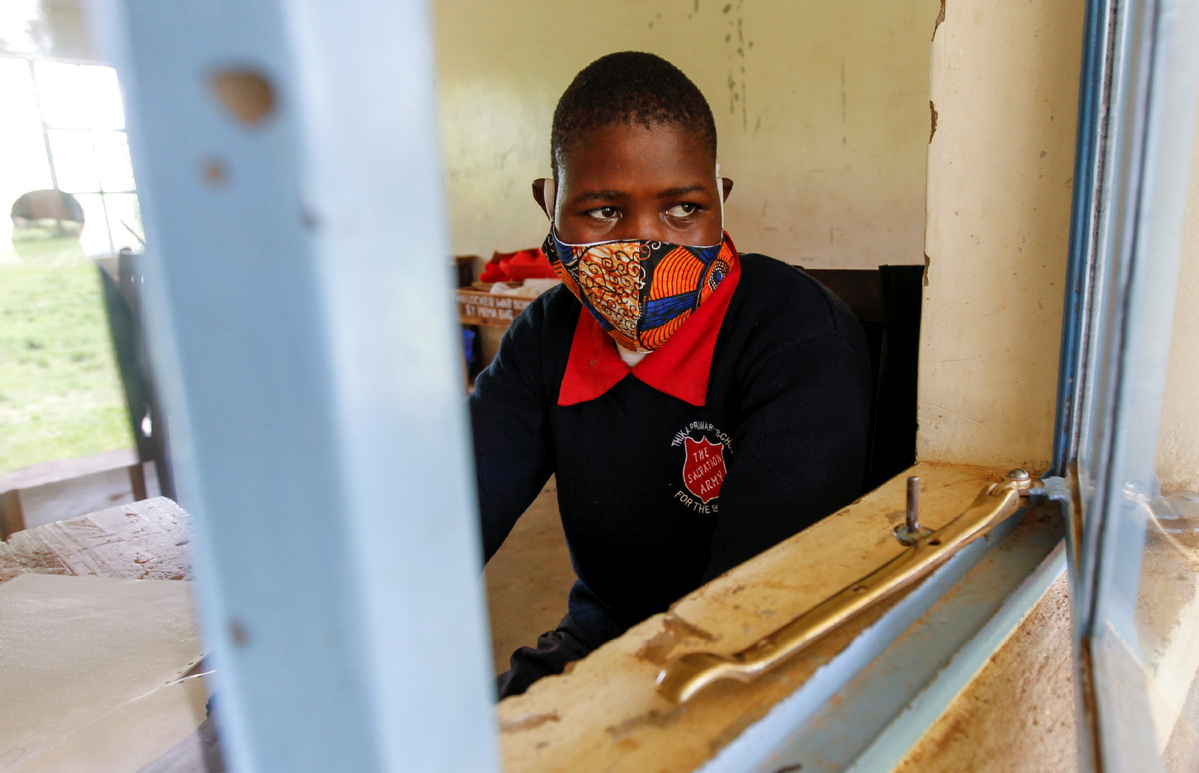
A pupil attends a lesson, wearing a protective mask and respecting social distancing amid the spread of the coronavirus disease (COVID-19) at the Thika school for the blind in Thika town of Kiambu county in Kenya, on Oct 29, 2020. (Photo: Agencies)
The Africa Centers for Disease Control and Prevention is projecting increased cases of coronavirus infections across the continent over the next two months due to the upcoming Christmas and year-end festivities.
Speaking at the weekly virtual news briefings on Thursday, Doctor John Nkengasong, the director of the Africa CDC, expressed concerns that the continent may experience a peak similar to the one witnessed in July and August as people interact a lot during the festive season.
"We expect to see movement of new cases from large cities to remote areas in the coming weeks. That's our greatest fear currently. This is because there will be large movement of people from capital cities to villages to connect with their families, as well as hold the traditional end of the year celebrations and that might drive the pandemic," he said.
Nkengasong is calling on national governments across the continent to increase their surveillance ability, especially in remote areas where the battle is expected to shift.
"We should have an honest conversation and a hard discussion on what we should do. Political engagement should step up and have an honest conversation with the public on why people should behave differently during this year's festivities, because the second wave of infection is already with us," he said.
He also expressed concerns on prevention fatigue in many African countries and a reduced level of masking, even as infection cases continue to rise.
Nkengasong said the continent is not out of the woods yet because of the increased cases that resulted with easing of lockdowns and other restriction measures to allow the economy to grow.
He said easing the lockdowns was undebatable because the majority of employment across the continent is informal.
The director expressed gratitude that the continent is better prepared now to battle the pandemic compared to 11 months ago, when there was a lack of diagnostics and personal protective equipment and a lack of clear understanding of the virus.
"We now know how to manage the patients. When we compare the mortality rate that time and now, it has decreased significantly and stabilized to around 2.4 percent across the continent," Nkengasong said.
He congratulated the large populated countries on the continent, including Nigeria, Ethiopia and the Democratic Republic of Congo, for working hard to maintain their level of infection cases.
"If the cases in these countries had gone up like we saw in Brazil and India, we would have been in a very difficult position," he said.
Meanwhile, the African Vaccine Acquisition Task Team, established by the African Union, is actively negotiating several financing arrangements to ensure that coronavirus vaccine is accessible in Africa as soon as possible.
With that backdrop, Nkengasong assured Africans that the Africa CDC is working closely with the World Health Organization to ensure the vaccines that will be introduced to Africa will have been fully tested and effective.
"We will ensure that no sub-standard vaccine is used in Africa," he said.
Nkengasong said the Pfizer COVID-19 vaccine that has already been authorized in the United Kingdom has gone through all three clinical trial phases, urging Africans that the vaccine has no safety issues.
"The vaccine's efficacy is 95 percent and the safety data is open for everyone. If the vaccine comes to Africa today, I will be the first person, together with my family, to be vaccinated, just to show the level of confidence that I have with the vaccines," he said.
The Africa Infodemic Response Alliance launched by the World Health Organization on Thursday also is expected to counter false information around coronavirus vaccines in Africa.
This is in addition to complementing on-the-ground public health awareness raising and community engagement efforts by creating a demand for vaccines in the continent.


